Since he came to power, President Xi Jinping has put China on the road toward a certain destiny. Central to the country’s economic, diplomatic and military initiatives, experts agree, stands the survival of the Communist Party. That party envisions a new, multipolar world order, in which China dominates its own hemisphere. What does the rise of China mean for NATO and the Armed Forces of the member states? At the February 2020 seminar of the Interallied Confederation of Reserve Officers (CIOR) in Bonn, Germany, experts elaborate on various topics concerning security, economic and cultural issues involving China. Is China, as the seminar’s title suggests, a future threat or partner, or is there still another angle to the debate?
Frans van Nijnatten
At the kick-off of the seminar in a packed conference room of the Gustav Stresemann Institute Lieutenant Colonel (R) Hans Garrels, Chairman of CIOR’s Seminar Committee, wants to see a show of hands from the participants: who, based on the knowledge he or she has now, is convinced China is a threat, who considers it a possible partner? The votes are roughly equally divided, with the majority of the reservists from CIOR members and associate countries attending eagerly conceding they are not experts on the matter. They see the congress as an excellent opportunity to inform themselves about a current topic in world affairs. Towards the end of the four-day meeting it is expected that at least some will have adjusted their opinions.
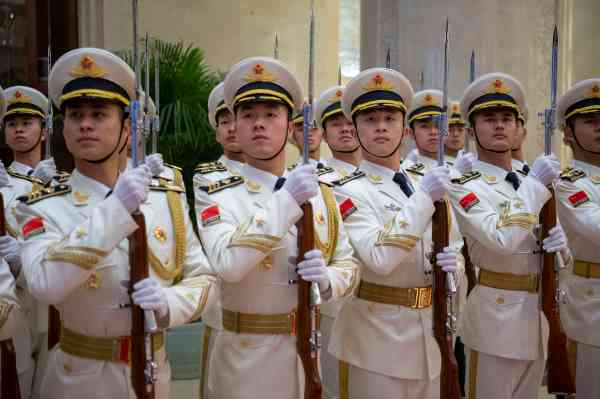
Underpinned by an unprecedented economic growth, China is building up the People’s Liberation Army and wants to play an influential role in military-strategic matters in Asia. Photo U.S. Navy, Elliott Fabrizio
In his introduction Philippe Welti, former Swiss ambassador to Iran and India and an expert on geopolitical and strategic affairs, explains China’s position in the regional and global environment. There is no doubt that China, underpinned by the unprecedented economic growth of the past decades, is building up the People’s Liberation Army (PLA) and wants to play an influential role in military-strategic matters in Asia, partly by outspending rivals Russia, India and Japan. Experts agree that the Chinese defence budget has grown steadily over the last twenty years, and economic growth has allowed the country to modernize its army (including the nuclear forces) and develop blue water naval capabilities. By the mid-2020s, China will have at least three aircraft carriers and a considerable submarine force, allowing it to undertake force projection in vast parts of the Asia-Pacific region. Besides other major military reforms that have been initiated there has been a flattening of the command structure combined with the strengthening of the party’s dominance over the military.
Beijing considers the U.S. to be a military competitor it has to erode and surpass, since no other country seems to be able to frustrate China’s long-term strategic objectives. Gradually, the PLA which, according to the Chinese government, had a budget of almost 178 billion dollars in 2019, is growing into a much more lethal military organization, with a considerable role for reservists and a better ability to perform joint operations.
Strategic opportunity
China, according to Dr. Christopher D. Yung, Dean of the US Marine Corps War College, recognizes a period of ‘strategic opportunity’ in which a relatively peaceful international environment allows it to expand its own military power and – through diplomatic pressure – to reform the international political system and agreements (United Nations, World Bank, cyber laws, the space and maritime domains, et cetera) so that they better suit the needs of authoritarian regimes.
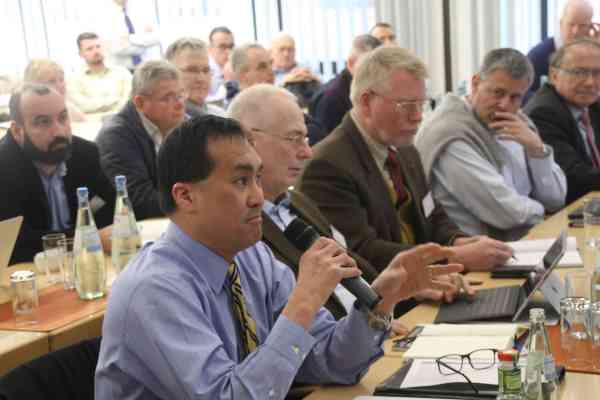
Discussing China’s role at the Bonn seminar: Dr. Christopher D. Yung (foreground) eleborates on the ‘strategic opportunity’ the Chinese Communist Party has recognized. Photo LtCol Bill Grieve (R), U.S. Army/CIOR Public Affairs
Dr. Oliver Corff, a specialist on China’s current affairs, says observers can derive clues to a Chinese grand strategy from official party decisions, five-year planning documents, yearly government reports, white papers and ad hoc programmatic speeches by party leaders. Considering itself the ‘infallible executioner of history’, the party seems to aim at making China the one dominant economic and military player in the region, exporting its own security model to neighbouring countries. To the outside world, China communicates a strategic narrative that conveys clear and diffuse messages at the same time. As an information source, therefore, Chinese media should be handled very carefully.
At the same time, China has a fragile political system and still spends more on internal security than on defence, because the Communist Party wants to retain its absolute grip on power. Internal unrest, economic downturns and unexpected crises, like the outbreak of the coronavirus, continue to test the party’s resolve. At the same time, the regime spends vast sums on programmes to restrain internet access for its 1.3 billion people, says John Lee of the Mercator Institute for China Studies. China’s digital espionage force, fitting a hybrid warfare philosophy, and its aspiration to become a cyber super power are just one side of the coin; using the internet for total domestic control, enhanced by initiatives like the social credit system, is the other.
Taiwan and the South China Sea
To keep its own people rallied around the country’s interests, the party, among others, constantly depicts security threats from the outside. It points at Taiwan, the East and South China Sea, South Korea, and the risk of a cyber attack from overseas. Dr. Sarah Kirchberger of the Institute for Security Politics at Kiel University, reminds the audience that in the case of Taiwan, China applies an ‘anaconda strategy’, aimed at ‘suffocating’ the island by military, economic and diplomatic pressure and cyber attacks. She poses an intriguing question: what would the reaction of NATO be if China really attacked the island? Would the member states stand united and if not and only the U.S. stood by Taiwan, could it spell the end of the Alliance? China, she stresses, invests heavily in Anti-Access and Area Denial (A2AD) capacities, while the PLA runs joint invasion scenarios during exercises.
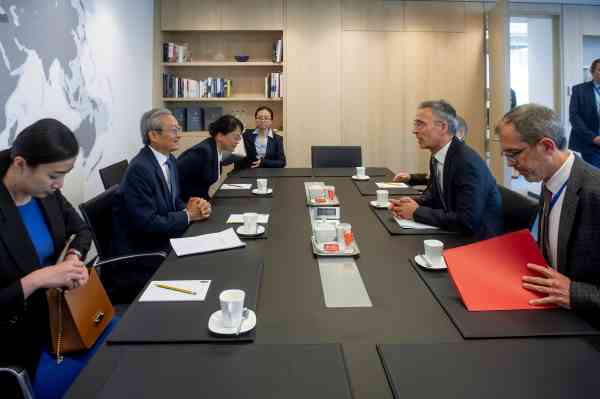
NATO Secretary General Jens Stoltenberg (right) and Zhang Ming, Ambassador of China to the European Union (opposite), discuss security affairs during a 2019 meeting in Brussels. Photo NATO
Beijing’s political-military strategy envisions not only the eventual taking of Taiwan and expanding sovereign maritime rights, but also the undertaking of out-of-area operations, aimed at the protection of overseas markets and other interests, like the military base operated by China in Djibouti in East Africa. Elsewhere on the continent China has been making inroads as well. Dr. Andreas Wolfrum, an expert on Chinese culture, explains that African nations are particularly susceptible to offers from Beijing because they hope they can somehow follow the example of China, which after the Communist takeover in 1949 was an underdeveloped country itself but is now, due to its policy of ‘catch up and overtake’, a player on the international scene. Not only in Africa, but also in Asia and Europe, China has gained foothold in markets – well-known examples being Huawei and 5G – and other sectors through the so-called Belt and Road Initiative it started in 2013. In the long run, however, accepting Chinese investments and loans may be subject to a quid pro quo with countries running the risk of Beijing ultimately demanding payback. Eventually, this could become a security threat and put alliances under pressure.
Since Xi became President in 2013, China has been using its foreign policy on a broader scale to influence other countries. In foreign affairs, China cooperates with the U.S. on certain issues, but tries to upset Washington on others. One of those areas is the South China Sea, where Beijing operates in a provocative way, claiming historical rights it has unilaterally written into law. Bill Hayton, journalist for BBC News and author of the book The South China Sea. Dangerous Ground, explains that China considers itself the rightful owner of the area which, because of its fishing grounds and natural resources, is of economic importance. The dispute revolves not only around existing islands or artificial ones constructed by China; it also has everything to do with China’s demand for access to the open sea for its navy and especially its SLBM-equipped submarines.
China seeks cooperation with countries that challenge the international status quo, such as Russia and Iran, and tries to weaken ties between the U.S. and its most loyal ally in the region, Japan. Japan, the U.S, Australia and India have responded by founding the Quadrilateral Security Dialogue, creating a multilateral platform for talks and combined military exercises. Another reaction has been the 2018 renaming of the U.S. Pacific Command into Indo-Pacific Command, to broaden the focus on an intertwined area where China wants to become the dominant factor.
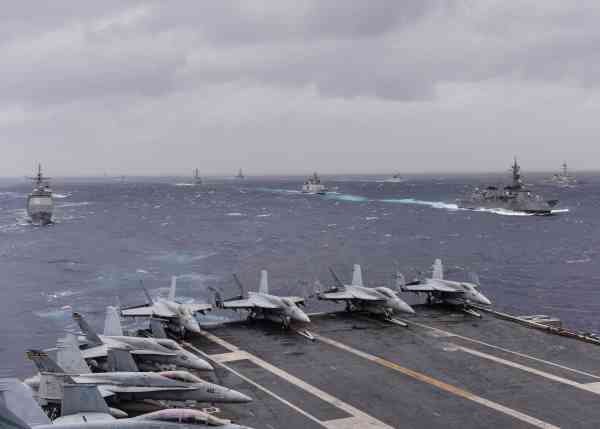
Ships from the Indian Navy, Japan Maritime Self-Defense Force and the U.S. Navy sail in formation as part of Malabar 2017 in the Bay of Bengal, a combined exercise to address the threats to maritime security in the Indo-Asia-Pacific region. Photo U.S. Navy, Holly Herline
Synergy with Russia
China not necessarily wants to go it alone. Dr. Lyle J. Goldstein, Research Professor in the China Maritime Studies Institute of the U.S. Naval War College, emphasizes the synergy China and Russia have developed in several important fields, ranging from trade to military matters. In an article for The National Interest, published during the Bonn seminar, Goldstein points at the strain Russia caused by closing major border crossings in the Far East due to the coronavirus crisis in China. It should be just a temporary setback, though. Only recently, Russian President Vladimir Putin has announced that his country is helping China to create a missile attack warning system, which clearly shows a growing military strategic cooperation between Moscow and Beijing. During a workshop, Goldstein challenged seminar participants to dwell on this rapprochement and the implications for NATO. Would it be realistic to expect a concerted military effort by both countries in the near future, with China, for example, attacking Taiwan and Russia simultaneously creating a conflict elsewhere? Should the West ‘up its game’ by using a wedge strategy, aiming at driving Russia and China apart? At a time when many NATO countries seem to distrust both Russia and China, there seems to be no easy solution.
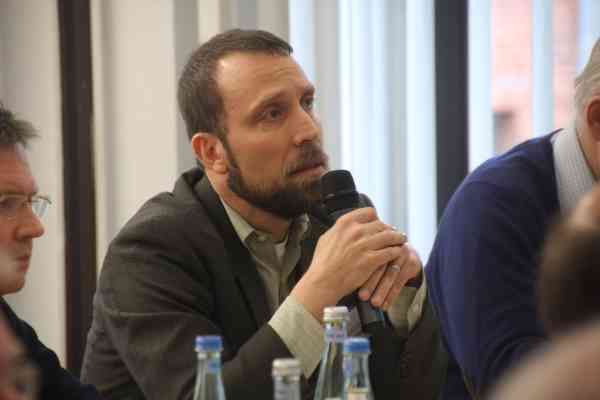
Dr. Lyle J. Goldstein points seminar participants at the growing military strategic cooperation between China and Russia. Photo Photo LtCol (R) Bill Grieve, U.S. Army/CIOR Public Affairs
In order to create nearby stability, China is expanding its political and military presence along its periphery and adjacent areas, but is currently not a real enemy, says Dr. Yung. He calls a short-term military confrontation in which the U.S. and other NATO countries would be involved, a far-fetched idea. At this moment, China would be at the losing end of such a conflict and the government in Beijing realizes that. It leaves him to conclude that instead of being either a threat to NATO or a possible partner, China should primarily be considered a challenge, especially to U.S. foreign policy. For participants in Bonn, many of them eager to follow the debate on China from now on more closely, that is one of the valuable insights to take away from the reservists’ seminar.
‘Armed Forces and CIOR should focus on the younger generation’
Hans Garrels on the need for reservists and their ideas
In 2019 the Dutch Armed Forces welcomed 564 new reservists, to bring the total to almost 5,800. The growth in the number of reservists is good news, but the Ministry could still step up its efforts to facilitate part-time military personnel in consultation with their civilian employers, says LtCol (R) Hans Garrels, Chairman of the Seminar Committee of the Interallied Confederation of Reserve Officers (CIOR). After a day of presentations and discussions about China and NATO at the yearly seminar in Bonn, Germany, Garrels expresses his views to the Militaire Spectator about the need to stimulate young people to become reservists and, as such, help determine the future of the armed forces. According to Garrels, reservists should not shy away from taking part in complex debates on international and security politics.
Frans van Nijnatten
‘Compared to other countries, I would describe the recognition of the position of reservists in the Netherlands as rather poor.’ Garrels, who works as an independent business consultant and is Deputy Head of Reservists at the Defence Materiel Organisation, chooses his words carefully. ‘For example, the Bundeswehr has a reservist or, as the case may be, replacement for almost all functional ranks, up to the highest level. In the UK, the General Staff has reservists at two and three star level. The same applies to France.’ In those countries, reservists apparently are not considered a ‘threat’ by the regular military. Garrels: ‘But I do not know of one Dutch reservist who intends to take over the position of his professional colleague.’
Hans Garrels: ‘Every reservist who has a certain position or ambition, should want to participate in the seminar to develop a broader understanding of global security issues and international decision-making’. Photo 2nd Lt Catalin Florea, CIOR Public Affairs
Garrels calls the influx of new reservists good news, but says a considerable effort should be made to make sure they do not leave after only a short stint.‘In some fields, we are starting to run into shortages of, for example nurses, engineers, and members of the National Reserve Corps. We see many students who join the National Reserve, which is a nice part-time job. Some of those people are really talented and ambitious, some play an important role in filling gaps that are the result of the many vacancies within the Dutch Armed Forces. But we keep cutting the budget for reservists too quickly, while at the same time we expect them to attend the required exercises and stay available. The Ministry should really apply better personnel care because if the military wishes to include reservists in their organization, it is also responsible for them. And why not develop a career policy for them?’
New initiatives needed
As a representative of the independent Dutch reservists’ associaton KVNRO Garrels emphasizes that the organization does not seek ‘to judge the world of professional soldiers.’ Nevertheless, the Ministry should not be afraid of suggestions made by people employed outside the military. ‘With a few exceptions, criticism usually comes from people who want to make an organization better. An organization must be willing to learn.’
‘When those responsible within the Dutch Armed Forces look at trends in society, they will realize that the young people we need nowadays cannot be lured with outdated employment contracts. We will have to seduce them by offering custom-made agreements and new incentives. The blind loyalty to one’s employer is a thing of the past. Nowadays, young people switch jobs more easily. So, why not introduce, as a replacement for the conscription we have put on hold, the right to serve? Unfortunately, this is not currently being discussed, and from the viewpoint of the organization there’s a big question hovering over this idea: is it manageable?’
To keep up the operational level of ambition the Armed Forces have set for themselves, new initiatives to attract reservists will come up, Garrels expects. ‘We cannot sit back and wait for young people, we will have to take action ourselves, simply because we need their knowledge.’
CIOR aims at young reservists
Garrels, himself a keen watcher of international affairs, enthousiastically tells about the organizational work needed to hold the yearly CIOR Bonn seminar. ‘We offer a platform for scientific debate on a current geopolitical-military topic, with highly-qualified speakers who influence discussions in the media and via books and articles. I think every reservist who has a certain position or ambition, should want to participate to develop a broader understanding of global security issues and international decision-making.’ Meanwhile the CIOR, too, has shifted its attention to the younger generation. ‘It became clear to us that we had to leave Cold War thinking behind us. We had to look at the CIOR and reservists differently than in the context of large mobile units and traditional military operations.’
Bringing young reservists to the seminar is one of Garrels’s top priorities. ‘The CIOR narrative, communicated by its Public Affairs Committee, is very good, but we have to get the message across to the young. We will sit together soon with some of their representatives to discuss some ideas, like a social media strategy.’ Pushing news through social media channels is one of the recommendations 34-year-old Captain Reitze Wellen (Royal Netherlands Army) makes. ‘The CIOR and KNVRO should make the information available as soon as possible, to allow those interested to make arrangements with their civil employers. Many young reservists would like to attend the seminar, if they only knew it existed.’
Without exception, the young people attending the conference say they find it enriching. ‘The seminar is an opportunity to meet collegues from other NATO countries and learn about their culture,’ says Reitze Wellen. ‘Normally, we consider the issues from an operational and tactical point of view. Experts at the seminar, however, zoom in on strategic developments and challenge participants to express their own thoughts.’ Lieutenant Desi van de Laar (33, Royal Netherlands Air Force) agrees with Wellen and appreciates the seminar as a platform to talk about current topics with collegues from abroad, like a reservist from Australia who has been involved in operations to fight the devastating fires that recently swept the country.
Besides the seminar, reservists can take part in CIOR programmes aimed at sharpening skills and knowledge. Photo 2nd Lt Catalin Florea, CIOR Public Affairs
Garrels: ‘Young reservists gain international contacts and insight into international decision-making. The CIOR is a versatile organization, which has attractive programmes to offer, like the Young Reserve Officers Workshop and its own Language Academy. These programmes are discussed during the seminars as well.’ Van de Laar describes the additional value these programmes have for her: ‘They enhance both skills and knowledge and create abilities you can use directly in your job.’
Garrels urges participants from as many CIOR member countries as possible to take part in the seminar, also to avoid one-sided views and to broaden the scope of the academic debate. At the end of each seminar, he gathers the evaluation forms participants have filled out. There is always room for improvement but Garrels’s starting point will remain signing on first-rate speakers whose views will help sharpen reservists’ opinions. ‘Armed Forces give young people a lot of responsibility. They learn to lead, persevere, and make difficult decisions and support them. On a broader scale, those qualities play a role in global security politics as well and that is exactly why reservists have a headstart when contemplating military and international affairs.’

